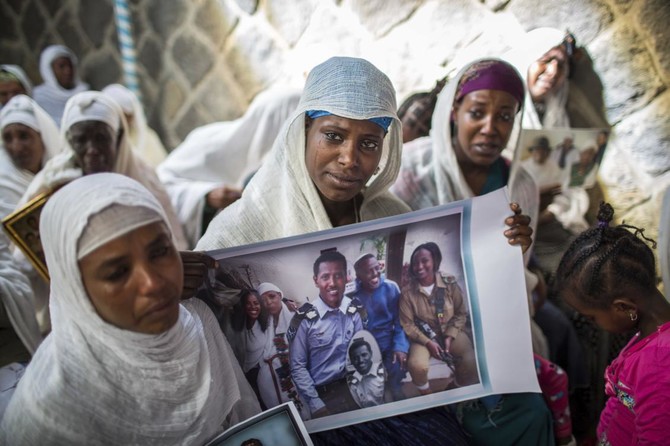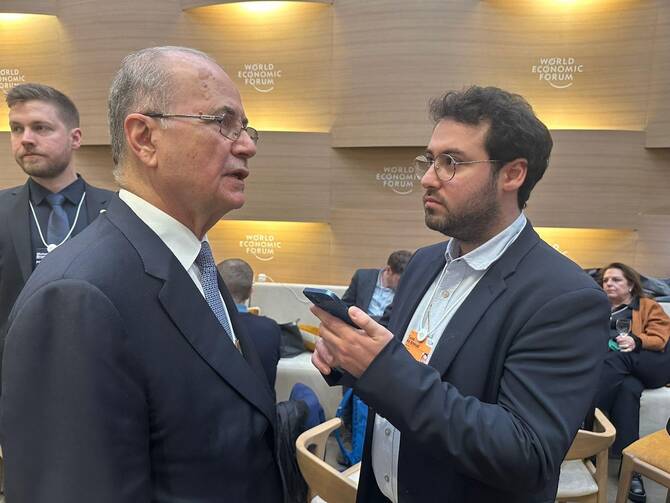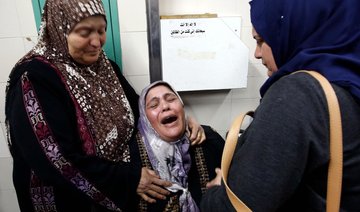JERUSALEM: Zemenech Bililin has not seen her sisters in more than a decade, since she immigrated to Israel from Ethiopia with part of her family. Now a 19-year-old infantry soldier in Israel’s military, Bililin says she is outraged that she is fulfilling her duties as a citizen but the state is shirking its responsibility to bring her relatives to Israel.
Bililin’s family is one of hundreds that have been split between Israel and Ethiopia over what they say is an inconsistent immigration policy, and whose fate hinges on an Israeli government decision over whether to allow for their reunification. Ethiopians in Israel say the bitter public feud to unite with long-lost relatives has exacerbated a feeling that the state discriminates against its Ethiopian minority.
“It’s shocking in my opinion. They only do this to us, to our ethnicity,” said Bililin. “The state should take responsibility and stop abandoning the Jews.”
The issue faces a critical juncture next week, when the government is tentatively scheduled to decide whether to allocate funding to bring as many as 8,000 Ethiopians to Israel to reunite with their families.
Israel clandestinely airlifted thousands of Ethiopian Jews from the country in the 1980s and 90s, spending hundreds of millions of dollars to bring the ancient community to the Jewish state and help them integrate. About 140,000 Ethiopian Jews live in Israel today, a small minority in a country of over 8 million. But their assimilation hasn’t been smooth, with many arriving without a modern education and then falling into unemployment and poverty.
As far as Israel is concerned, the drive to bring over Ethiopia’s Jewish community officially ended in the 90s, but amid pressure from lawmakers and family members, successive Israeli governments have opened the door to immigration by a community of descendants of Ethiopian Jews who were forced to convert to Christianity under duress about a century ago.
Although many of them are practicing Jews, Israel doesn’t consider them Jewish, meaning they are not automatically eligible to immigrate under its “law of return,” which grants automatic citizenship to anyone with at least one Jewish grandparent. Instead, the government must OK their arrival.
Community members have been permitted to immigrate over the last two decades in limited bursts that have left hundreds of families torn apart.
Nearly 8,000 people in Ethiopia are hoping to immigrate, among them Bililin’s sisters, who as married women applied to immigrate separately.
In 2015, Israel agreed in principle to bring over the remaining Ethiopians who have Israeli relatives, vowing that it would be the last round of Ethiopian immigration and clearing the way for the arrival of 1,300 people last year.
Israel says it has continued to greenlight the community’s immigration on humanitarian grounds but it also has set a slew of requirements on those waiting in Ethiopia, in part to prevent what could be an endless loop of immigration claims.
Avraham Neguise, an Ethiopian-Israeli lawmaker in the ruling Likud party who chairs the Israeli parliament’s Absorption and Diaspora Committee, accused the government of dragging its feet and in turn damaging the Ethiopian community’s already brittle relationship with the state.
“The government is pursuing a discriminatory policy by not having the remaining Ethiopian Jews immigrate,” he said. “There’s no doubt that it harms the community’s trust.”
While Ethiopians have made strides in certain fields and have reached the halls of Israel’s parliament, many complain of racism, lack of opportunity, endemic poverty and routine police harassment.
Those frustrations boiled over into violent protests three years ago after footage emerged of an Ethiopian-Israeli in an army uniform being beaten by police. Thousands of Ethiopian Jews and their supporters blocked main highways and clashed with police in a bid to draw attention to their plight, including what they say is unchecked police brutality against their community members.
Activists have been lobbying the government to approve the immigration, penning letters to Israeli officials and sharing their poignant stories of separation in parliamentary committees. They see the issue as an easily solvable one that has needlessly shattered families and marooned people in a troubled country.
“Daughters are getting married in Israel without their mothers at their side. Sons are going to war and not returning without having their fathers there to bury them. We’re talking about human lives here,” said Alisa Bodner, a spokeswoman for Struggle for Ethiopian Aliyah, an activist group.
The community expected to see funding for immigration in the proposed budget, which is expected to come up for a vote as early as next week. But they were stunned when it was absent from preliminary versions of the budget.
The anticipated estimated cost of flying all 8,000 people to Israel along with housing and social services is roughly 1.4 billion shekels, or about $400 million, a sizeable figure but a tiny fraction of a nearly 500 billion shekel ($143 billion) national budget, according to an official from the finance ministry. The official spoke on condition of anonymity because she was not authorized to discuss a budget that has not yet been passed.
Neguise and the activists are engaged in a last-minute push to have the families’ plight included in the upcoming budget and to do so the Israeli government must vote on the issue, which could happen on Sunday. However, it is unclear whether the government would agree to bring all of the Ethiopians to Israel, or just limited numbers as in the past.
Regardless of the outcome, hundreds of people are expected to protest outside parliament the following day demanding action.
Israel’s Finance Ministry said it was up to the government to decide on the issue. There was no immediate comment from Israel’s prime minister’s office.
The Ministry of Immigration and Immigrant Absorption said “the subject of the continuation of Ethiopian immigration is on the government’s agenda.” But with the government embroiled in a coalition crisis over separate issues, the plight of the Ethiopians may not be its top priority.
“It’s intensely painful. I miss them like crazy,” Bililin said about her sisters. “(The government) doesn’t understand that pain.”
Ethiopian-Israelis decry family separation as discriminatory
Ethiopian-Israelis decry family separation as discriminatory

Palestinian PM: Gaza reconstruction advancing amid US talks, Saudi support

- In an interview with Arab News, Mohammed Mustafa said “Palestinian objective is clear,’ but we need to ‘get Gaza right first’
- Speaking at Davos panel, PM calls Kingdom a key stakeholder in the Palestinian cause
DAVOS: Palestinian Prime Minister Mohammed Mustafa told Arab News that progress is underway in Gaza’s reconstruction talks, with clear dialogue between the Palestinian Authority, US President Donald Trump and Special Envoy Steve Witkoff.
“I think the Palestinian objective is pretty clear, it has been for a long time, which is to establish their own independent state, (achieve) international resolution,” Mustafa said, noting that “we need to get Gaza right first.”
Despite a ceasefire taking hold earlier in 2025, Gaza remains under what the international community describes as an Israeli-enforced blockade. Basic supplies such as food and medicine are still subject to Tel Aviv’s scrutiny, which controls all access in and out of the Strip.
On Sunday, Trump announced that his Gaza plan had entered its second phase, in which Hamas would release all remaining hostages, Israel would free more Palestinian prisoners and fully withdraw its forces — a step international actors say should pave the way from ceasefire to lasting peace.
The formation of a technocratic National Committee for the Administration of Gaza, or NCAG, composed of Palestinian figures, marks the first concrete step toward implementing the plan and restoring Palestinian ownership of the next phase.
A precise timeline for reconstruction remains unclear, with analysts warning that major works hinge on Hamas disarmament — a politically fraught task assigned to the Gaza Peace Board.
“It’s going to take more than two years to fix Gaza, but at least we want to make sure that things are in the right direction,” continued Mustafa, adding that the West Bank remains part of the broader conversation.
He stressed the urgency of reunifying Gaza’s institutions with the West Bank to achieve the PA’s political goal of independence.
“Our priority is what’s happening to our people in Gaza today. Despite four months passing (after) the ceasefire, people are still dying. Yes, there is a ceasefire but it’s not fully observed due to Israeli military actions,” he said, stressing that “shelter is the biggest challenge” at the moment.
Mustafa revealed he held “very active and useful” talks with US officials on Tuesday, saying both sides “share the same goals” on the matter.
Later in his panel, Mustafa said a Palestinian reform plan is in the works with the help of partners including Saudi Arabia.
In a session at the World Economic Forum in Davos, Mustafa said Saudi Arabia and other partners such as Egypt and Jordan were not just contributors but key stakeholders in the Palestinian cause.
“Saudi Arabia along with France have been working with us on the two state solution and integrating it,” he said.
“We want to work with the board of peace to ensure that they do their part of things to prepare for reconstruction efforts,” he added.
Mustafa said although some view the Oslo treaty as outdated, it still holds its place as an internationally recognized framework.
“According to the Oslo agreement, Israel should have withdrawn from most of the West Bank and Gaza. We want to see Israel respecting this agreement,” he said.
“The Israelis did not respect the economic part of the treaty. We are praying for a heavy price, not only in Gaza and people being killed every day. But also actions on the ground in the West Bank. We said clearly, we want to achieve our goals by peaceful means,” he said.
“Israel today holds $4 billion of our government’s money. They control the borders and collect the tax fines. For the past four months they have sent zero dollars. Our ability to govern has been impacted due to this,” Mustafa said.
In a sideline interview with Arab News, Palestinian Ambassador to Switzerland Ibrahim Mohammad Khraishi said that he met an Egyptian minister who expressed hope that the Rafah crossing could soon reopen on both sides.
“We need the understanding from all,” Khraishi said. “Yes, we have this administrative committee (as part of the Gaza Peace Board), but without the Palestinian Authority, they cannot deliver. Because we have everything. We have the institutions, we have the government,” Khraisi said.
Commenting on recent West Bank developments, including Israeli bulldozers razing the UNRWA compound in occupied East Jerusalem on Tuesday, he warned: “This is the scenario for the Israelis. For them, there is nothing to talk about. It’s total crash and destruction. Now, what they are doing in West Bank is on the way.”













